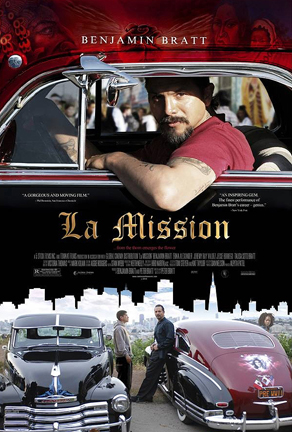City College lends talent to feature film ‘La Mission’
By Kwame Opoku-Doku III
Contributing Writer

When Peter and Benjamin Bratt set out to score their newest film, “La Mission,” City College Latin American studies instructor Greg Landau seemed like a natural choice to help them achieve the “Mission sound.”
Landau, a three-time Grammy nominated music producer, played guitar for numerous bands during the Latin rock movement in the 1970s. A friend of their mother Eldie Bratt, Landau has known the brothers since they were children.
Eager to express a vision of the neighborhood that was not just about Latin music, the Mission district natives sought to create a complex blend of oldies, R&B, rock and Latin.
“It was a challenge to put together a musical soundscape for the place I grew up,” Landau said. “It forced us all to look inside and see what music told our story and the stories of the different generations that inhabit this same space.”
Landau said he worked mainly on post production, although he did help record music for the graduation scene and gathered “local hip music” for possible use in the film.
“La Mission,” which debuted at the Sundance Film Festival, relied heavily on its soundtrack to tell its story – blending complex styles of music with an equally complex story that mixes themes of spiritual ascension and violence.
The main vehicle of the film, Che Rivera, is played by Benjamin Bratt. Bratt was a former student of City College music instructor Helen Dilworth when she taught at Lowell High School. Caught in a battle between the socially-accepted chauvinism he was raised with, and the love he feels for his gay son, Che finds healing and inspiration from his neighbor, Lena, played by Erika Alexander, who is also a former City College student.
An activist and advocate for youth, Alexander is known for her portrayals of strong-willed women. Jehmu Greene, president of the Women’s Media Center, called Alexander “a powerful voice for youth at risk – girls and women.”
Dilworth, a former instructor of Alexander couldn’t be happier for her prior students. She was particularly pleased with Alexander’s portrayal of a strong African-American woman as a female lead and the cultural diversity and warmth of the film.
“The film deals with very important themes that need to be dealt with,” Dilworth said.
Although her role as co-producer may not have always been harmonious, for City College film instructor Debbie Brubaker, “La Mission” was really something special to be a part of.
Dubbed “the Godmother of the San Francisco independent film movement,” Brubaker’s first job was to convince Peter Bratt to cut some 30 or so pages of his script.
“It was Benjamin initially who was most upset over the idea of cuts in the script,” she said. “But when he saw the re-worked script he couldn’t find what was missing.”
She said her main duties were hiring and handling the crew — several of whom, including production manager Chris Martin, were former and current City College students. She also acted as a liaison with the union, a shepherd of sorts, staying on top of the crew and the budget of about $2.25 million, which she said should have been closer to $4 million.
As the production progressed, numerous challenges surfaced.
“Locations were tough, working in the Mission,” Brubaker said. “Having big actors going into honey wagons instead of trailers, dealing with the residents. It was hard.”
But for Brubaker, it was a labor of love. She really enjoyed working with the Bratt brothers. She even called Peter the real star of the project.
“He’s a really wonderful man,” she said. “Very sensitive. Very spiritual.”
She loved the movie, but said the producer in her would have cut an additional 10 minutes.
“What’s great about the film is that you don’t have to be gay or Latino for the film to touch you. It speaks to everyone,” Brubaker said. “That’s its biggest strength.”
“La Mission” has become a hit among Latinos, whom professor Landau says “rarely see complex portrayals of working-class people, especially Latino gays.”
“The film told an important story about tolerance and the way men try to use power and violence to get their way and lose sight of their humanity,” Landau said.
Dilworth couldn’t be happier with its success, because it’s an independent film dealing with a culture rarely portrayed in movies.
“It touched me in a way that films rarely do,” Dilworth said. “And that’s enough for me.”

Comments are closed.